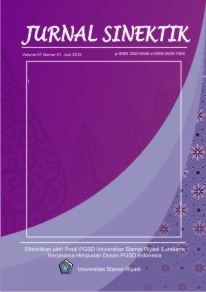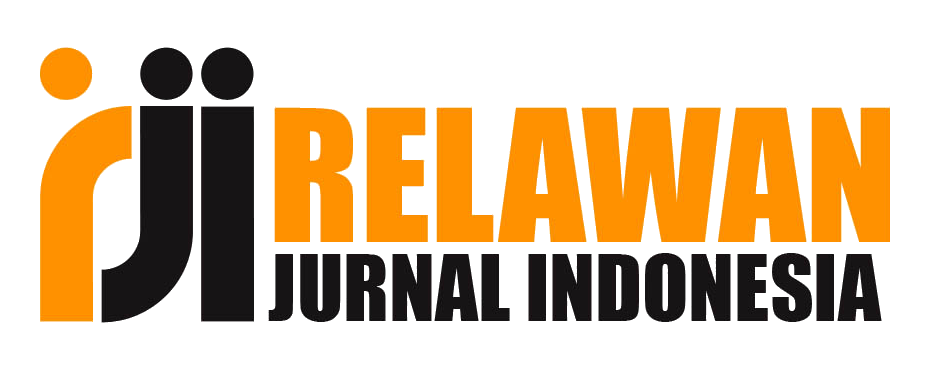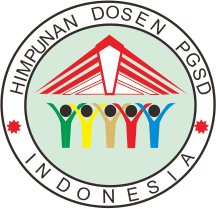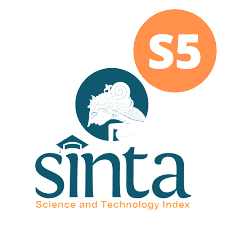Pengaruh Model Pembelajaran Problem Based Learning Berbasis TPACK Terhadap Keterampilan Literasi Pembelajaran IPAS Kelas IV
DOI:
https://doi.org/10.33061/js.v7i2.10017Keywords:
Problem Based Learning (PBL), TPACK, literacy skills, science scienceAbstract
This research is a type of quantitative research. The number of samples was 27 students of SD Negeri Madyotaman No. 38 Surakarta for the 2022/2023 academic year who were selected through a saturated sampling technique. Data collection techniques include observation, interviews, tests, and documentation. The test was carried out twice, namely pretest and posttest with the aim of determining the improvement of students' science learning literacy skills before and after treatment. Data analysis techniques in the form of hypothesis tests with T-tests using the Paired Sample T-test formula. Data analysis obtained tcount = 13.521 and ttable with dk = (N-1) so (27-1) = 26 with a significance level of 5% which is 1.706. Then tcount > ttable or 13.521 > 1.706 which means Ha is accepted and Ho is rejected. So it was concluded that "There is an influence of the use of TPACK-based Problem Based Learning Learning Model on Class IV science learning literacy skills of SD Negeri Madyotaman No.38 Surakarta for the 2022/2023 academic year" at a significance level of 5%.
References
Agustin, P. A., Natalina, M., & Suryawati, E. 2018. Profil of Science Teachers ’ Pedagogical Content Knowledge ( Pck ) At Public Junior High School in Siak Regency Profil Kompetensi Pedagogical Content Knowledge ( Pck ) Guru Ipa Smp Di Kabupaten Siak. Jom FKIP, 5, 1–11.
Burhan Bungin. 2005. Metodologi Penelitian Kuantitatif: Komunikasi, Ekonomi, dan Kebijakan Publik Serta Ilmu-Ilmu Sosial Lainnya. Jakarta: Kencana Prenadamedia Group.
Handini, O., & Mustofa, M. 2022. Application of TPACK in 21st Century Learning. International Journal Of Community Service Learning, 6, 530–537.
Hasanah, I. M. L. D. P. R. 2023. Efektivitas Model Pembelajaran Pilihan Aktivitas Belajar (PAB) Dalam Implementasi Kurikulum Merdeka Siswa Kelas 4 SDN Poria Pelawad 5 Kota Tangerang. Education Journal : General and Specific Research, Vol. 3 No. 1 2023: Februari, 168–172.
Hermawan, R., Rumaf, N., & Solehun, S. 2020. Pengaruh Literasi terhadap Keterampilan Membaca pada Siswa Kelas IV SD Inpres 12 Kabupaten Sorong. Jurnal Papeda: Jurnal Publikasi Pendidikan Dasar, 2(1), 56–63.
Hosnan. 2014. Pendekatan saintifik dan Kontekstual dalam Pembelajaran Abad 21. Bogor: Ghalia Indonesia
Juwandani, E., Aliyah, ASN, Melati, CS, & Susanto, R. 2022. Pembelajaran Campuran Strategi di Era New Normal (Studi Kompetensi TPACK).Pedagonal: Jurnal Ilmiah Pendidikan,6(2), 169–179.
Mahpudin, M. 2018. Peningkatan Hasil Belajar Ipa Melalui Metode Eksperimen Pada Siswa Kelas V Sekolah Dasar. Jurnal Cakrawala Pendas, 4(2), 1.
Rafi, I., & Sabrina, N. 2019. Pengintegrasian TPACK dalam Pembelajaran Transformasi Geometri SMA untuk Mengembangkan Profesionalitas Guru Matematika. SJME (Supremum Journal of Mathematics Education), 3(1), 47–56.
Sugiyono. 2016. Metode Penelitian Kuantitatif, Kualitatif, dan R&D. Bandung: Alfabeta.
Syahril, M. 2021. Implementasi Problem Based Learning Berbasis Tpack Untuk Meningkatkan Minat Belajar Tematik Siswa Sd. PINISI: Journal of Teacher Professional, 3(November), 452–460.
Yusuf, M. 2017. Model Problem Based Learning Membangun Kemampuan Berfikir Kritis Siswa Sekolah Dasar. Cakrawala Pendas, 3(2), 57–63.
Downloads
Published
How to Cite
Issue
Section
License
Copyright (c) 2023 Jurnal Sinektik

This work is licensed under a Creative Commons Attribution-NonCommercial 4.0 International License.
Authors who publish this journal agree to the following terms:
- Authors retain copyright and grant the journal right of first publication with the work simultaneously licensed under a Creative Commons Attribution License that allows others to share the work with an acknowledgement of the work's authorship and initial publication in this journal.
- Authors can separately make additional contractual arrangements for non-exclusive distribution published by the journal (e.g., publish it in a book), with an acknowledgement of its initial publication in this journal.
- Authors are allowed and encouraged to send their work via online (e.g., in the institutional repositories or their website) after published by the journal.














